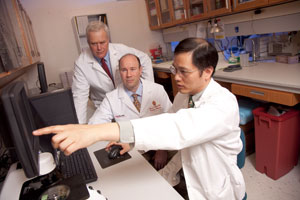
UW Radiology and Neurosurgery Researchers at the UW Carbone Cancer Center (UWCCC) announced that “a new class of tumor-targeting agents can seek out and find dozens of solid tumors, even illuminating brain cancer stem cells that resist current treatment.” Comprised of alkylphosphocholine molecules, these agents are remarkably adaptable in identifying tumors, tagging 55 of 57 different cancers during a multi-stage study that included testing on human patients.
Jamey Weichert, Ph. D., Associate Professor of Radiology, acted as co-lead author of the study, in conjunction with John S. Kuo, M.D., Ph.D., Associate Professor of Neurological Surgery. Other radiology members contributing to the investigation include Perry Pickhardt, M.D., Professor of Radiology, and Lance Hall, M.D., Assistant Professor of Radiology.
Weichert is also the cofounder and chief scientific officer of Cellectar Biosciences, a Madison-based company developing the APC molecules for cancer imaging and therapy. “The department has been supportive [of Cellectar] since I arrived at UW 15 years ago,” said Weichert. “They’ve provided lab start-up funds and salary support [and have played] a major role in the development and financial assistance of the small animal imaging lab that has been so important in the development of these agents.”
Many tech start-ups have humble beginnings, and Cellectar is no different. According to Weichert, “We first met about this company in Fred Lee’s living room, in the fall of 2002. There were 10 radiologists there, and we were looking for a half-million dollars to open a lab in Research Park.” Weichert then met with friends and colleagues to present the idea in an attempt to reach the company’s funding target. Not long after, he made another pitch to Wisconsin Investment Partners (WIP), a local group of angel investors.
After some deliberation, both parties were willing to provide $500,000. “Instead, I told them they each could put in $300,000, that we would take $600,000,” said Weichert. “I had no idea what I was doing back then. What I’ve learned by now is that you take all the money you can get,” he added, chuckling.
During the 12 years following the inception of the company, their operations have expanded significantly. Cellectar opened a radiopharmaceutical manufacturing plant in late 2007, which includes a GMP (Good manufacturing practice) manufacturing suite and analytical laboratory, allowing the company to be completely independent in radiopharmaceutical research, development, and manufacturing.
Read more about these tumor-targeting agents at UWSMPH News.
Read the full research article, courtesy of Science Translational Medicine